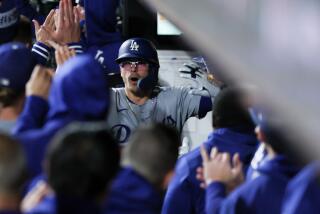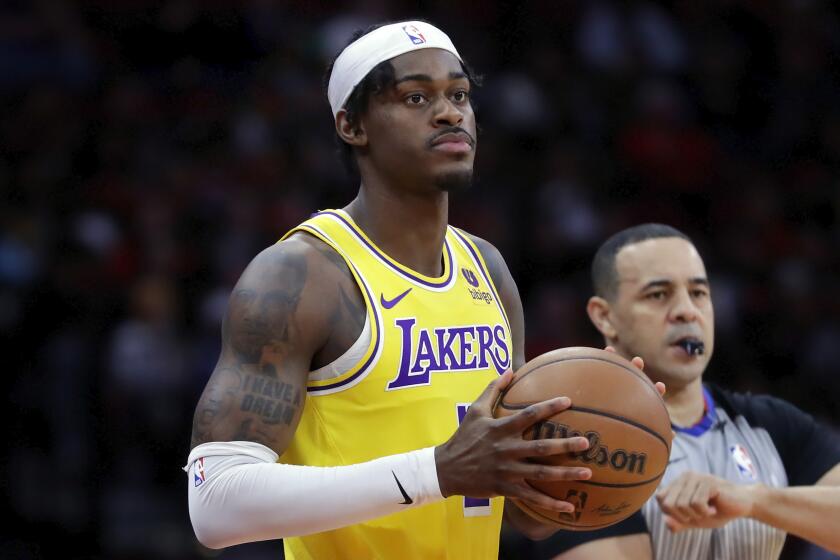A Glimmer of Distant Diamonds
- Share via
CINCINNATI — The tying run stood on third base, the winning run was on first base, and approaching the plate with a bat in his hand was Reggie Sanders, with the Cincinnati crowd, what there was of it, chanting: “Reggie! Reggie!”
A new Mr. October in the making.
The Atlanta manager, Bobby Cox, changed pitchers. And when he sat back down inside the dugout, he happened to remember one interesting Sanders statistic.
Cox nudged his pitching coach, Leo Mazzone, to say: “You know, he hit into 10 double plays this year.”
“Well, shoot, Bob,” Mazzone said, spitting, “I sure as hell hope he makes it 11.”
Sanders obliged with a made-to-order grounder to the Atlanta shortstop, Rafael Belliard--”I saw Raffy’s eyes light up,” second baseman Mark Lemke said--who stepped on second base and fired to Fred McGriff at first for a game-ending double play.
And that was how the Braves beat the Reds, 2-1, in 11 innings Tuesday night in Game 1 of the National League playoffs.
They did it by playing Brave baseball. By playing 11 error-free innings. By making all the big plays. By making all the right moves. By using 19 different players. That is how the Braves play the game, why they are in the playoffs for the fourth season in a row.
But something funny is going on.
People have been bad-rapping them.
“People have been calling them stuff,” Cincinnati shortstop Barry Larkin said. “Calling them the Buffalo Bills of baseball, and all.”
Unfairly?
“Very,” said Atlanta relief pitcher Mark Wohlers. “Totally. Completely. It stinks.”
It is an insult. It symbolizes the inability of a great team to win the greatest prize. In the Bills’ case, it has been the Super Bowl. For the Braves, it has been the World Series.
All these stars, but no diamond rings.
Atlanta has been in so many great October games like Tuesday’s. That amazing 1-0 loss at Minnesota. That unforgettable Francisco Cabrera game-winning hit against Pittsburgh. That wild, 11-inning, Game 6 loss at home to Toronto. Games for the ages.
But no diamond rings.
Atlanta has had such great fan support. Tomahawk choppers. Ted and Jane. Jimmy and Roslynn. Face-painted fans from all over the Southeast, following “America’s Team” in person or by superstation.
But no diamond rings.
And here they are again, listening to people talk about the speed of the Reds, about the power of the Cleveland Indians, about the “refuse to lose” spirit of the Seattle Mariners.
And them?
“It’s like we’re creeping into this thing, quietly,” Atlanta pitcher John Smoltz said.
“Good. We like it like that.”
The opener of this series was a typically Brave-hearted effort. Unable to get a runner to second base over eight innings against Cincinnati’s Pete Schourek, they kept hanging in there. That is the Braves’ specialty: Hanging in there. Avoiding defeat with a move here, a move there.
Chipper Jones and McGriff began the ninth inning with singles. David Justice got a run home, just by getting wood on the ball. That quickly, the Braves were back in it.
“Look, we don’t do a whole lot of flashy things,” Lemke said. “We’re not real awesome in any one area, except maybe pitching. But we’re fighters.”
Cox was in their corner. He knew when to attack and knew when to back off.
When Wohlers was blowing batters away, striking out all three in the 10th, some managers would have sent him back out there. Cox would not. He knew Wohlers was, by nature, done for the night.
“He threw 21 pitches,” Cox said. “That’s enough.”
Twenty-one pitches. Not so many. Such temptation it must have been to go with Wohlers out there, with that 95-m.p.h. heat of his. To use the Braves’ ace instead of. . . .
Brad Clontz?
But that’s what Cox did. He sent in Clontz to protect a 2-1 lead against one of the best teams in the game. He also sent in Belliard to play short, even though Atlanta’s defense had already turned four double plays with Jeff Blauser out there. Cox doesn’t just sit there with his coaches and spit. He makes moves.
“We use all 25 guys on this team,” Lemke said.
Clontz got clobbered. Thomas Howard took him to the right-field corner for a double. But Cox didn’t panic. He left Clontz out there to face the dangerous Barry Larkin, who grounded out to Lemke.
Then he brought in Steve Avery, a starter by trade, to face one batter. Third base was occupied. Avery pitched around a pinch-hitter, Mariano Duncan, and walked him, setting up a force at second base. Intentionally?
“No!” Cox bellowed. “Avery’s throwin’ the livin’ dickens out of the ball! I was lookin’ for a strikeout!”
That brought up Sanders. Cox changed pitchers again. He was lookin’ for a double play.
He got one.
That is how the Braves win big ball games. Not all of them, but a whole lot of them.
More to Read
Go beyond the scoreboard
Get the latest on L.A.'s teams in the daily Sports Report newsletter.
You may occasionally receive promotional content from the Los Angeles Times.










